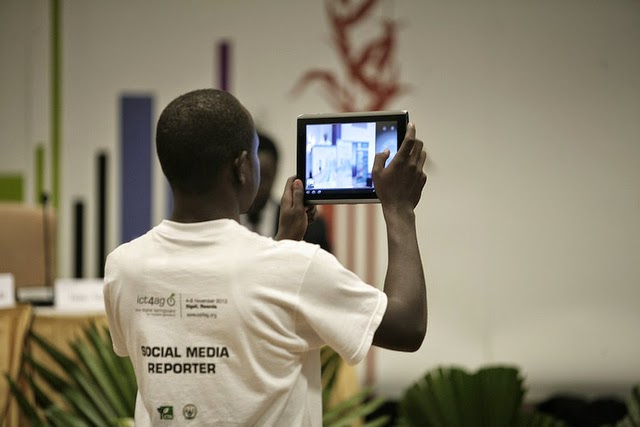By Geoffrey Nyamasege
Library Assistant and Social Media Officer
Strathmore University, Nairobi, Kenya
The SCECSAL Conference held in Malawi’s capital city Lilongwe was a great success by all means. It drew paper presenters from across African countries and by extension from other parts of the world. There were many lessons learned. It’s my hope that such lessons would be applied in parent institutions and organizations to facilitate effective service delivery and to keep our users engaged. It’s behind this zeal then I would want to share my two cents of thoughts of what I think we should do as professionals.
 |
Geoffrey Nyamasege presenting a paper on social media
at SCECSAL 2014, Lilongwe, Malawi |
First and foremost, we all know and recognize that information is key in all sectors of the economy. Key because information cultivates knowledge. This information must be created, organized and disseminated through effective and user friendly channels in order to benefit the users. To achieve this, information professionals need to study their surroundings and seize the opportunities such a surrounding presents. They must take the good of their environment.
Investing in creating and disseminating knowledge will facilitate generation of future knowledge. Analyzing and interpreting research findings particularly from the just concluded SCECSAL 2014 will help formulation and implementation of actionable strategies. This will help in return improve our economies of scale. Therefore, we must recognize the importance of information in all sectors of the economy.
As professionals, we must think beyond the theories thought in classrooms of the role of libraries and information centres. We must now develop good practice out of these theories. We must envisage the changing roles of these institutions in research and development. For instance, we must think along the emerging roles such as supporting current knowledge and national economy; facilitating creation of new and impacting knowledge through research. We must look at the value of knowledge in our custody and that which is being created in relation to the way such knowledge is used.
Information professional must establish a good working relationship with the rest of the faculty. Their new role would be to improve perceptions and increase resources provision. To achieve this, they would need to continuously offer Information literacy programs. And here the use of web technologies plays a major role as an enabler to knowledge dissemination. It would help in the utilization of resources and above all, improve user independence.
Another key component is that Information professionals must make their presence known and felt. How? In the presentations made for instance, internet usage among them Social Media and web technologies, presents best platforms for the information professionals to engage their counterpart colleagues as well as their users. SCECSAL resorted to use LinkedIn, twitter and YouTube accounts. This will develop long term relationships and long-life learning.
Information professionals must use the available technologies and incorporate them as part of their best practices. However, to realize this, there must be an enabling environment as well as capacity development. Such platforms must equally be applied not just for social networking but for professional work. It’s therefore important that web technologies be an integral part of our work, part of our strategies for the purposes of our core mandate in higher education. All these must be aimed at providing quality service delivery to our users be it be on-campus or off-campus!
What do we need to do to achieve this? We must make it our responsibility and our business. We must continuously create awareness by convincing and making those that we serve understand why this is so critical.
Of importance, everything we do or engage in, must translate to quality service delivery of our clients. This is how we will get to impact higher education and the society. Then we must now look beyond. We must transform the social economic development both of our institutions and organizations as well as at the national level. But then, wait a minute! We must yearn to collaborate and share knowledge. We must formulate new channels of knowledge sharing. We must in our institutions and organizations improve the quality of readership and scholarship.






































